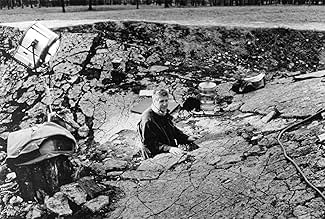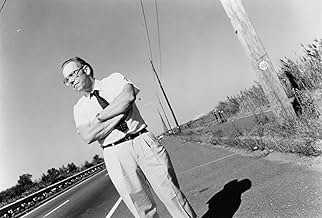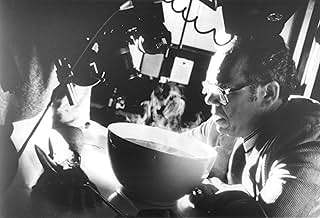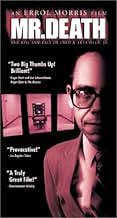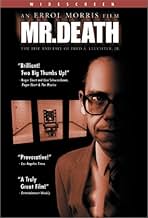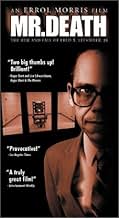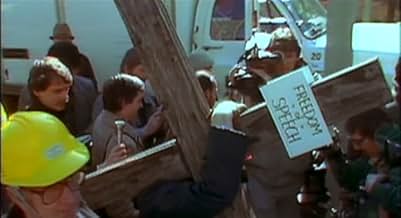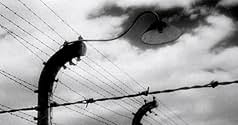IMDb रेटिंग
7.5/10
5.9 हज़ार
आपकी रेटिंग
अपनी भाषा में प्लॉट जोड़ेंA cinematic portrait of the life and career of the infamous American execution device designer and holocaust denier.A cinematic portrait of the life and career of the infamous American execution device designer and holocaust denier.A cinematic portrait of the life and career of the infamous American execution device designer and holocaust denier.
- पुरस्कार
- 1 जीत और कुल 8 नामांकन
Fred A. Leuchter Jr.
- Self
- (as Fred Leuchter)
Caroline Leuchter
- Self
- (वॉइस)
Adolf Hitler
- Self - Leaves Plane
- (आर्काइव फ़ूटेज)
- (बिना क्रेडिट के)
Errol Morris
- Self - Interviewer
- (वॉइस)
- (बिना क्रेडिट के)
फ़ीचर्ड समीक्षाएं
Leuchter is an expert in execution technology (designer of electric chairs, gas chambers, etc.), whose career was wiped out when he got swept up in the Holocaust revisionism movement (he testified, as an expert witness in a defamation suit, that the Auschwitz crematoria could not and did not serve as gas chambers). In this vivid documentary, Morris lets Leuchter speak for himself (which reveals him to be a man of limited horizons with a - let's say - quirky moral code, likely undone by hubris rather than evil [although Morris may deliberately be making that as far as possible an eye-of-the-beholder issue]), while providing a blizzard of visual accompaniments that emphasize the lurid raw material of Leuchter's life (a strategy indicated by the B-movie undertone of the title), and flirt with his obvious sense of his own heroism. Leuchter has more than enough rope here to hang himself, and pretty much gets the job done. Morris doesn't try to explore the issue of Holocaust revisionism generally, pretty much taking our revulsion on faith: if anything, from my limited previous reading on the subject, that's doing Leuchter a favor. Anyway, revulsion or not, it's hard not to be fascinated by a man who can calmly chatter about his value-pricing approach to selling death machines (although custom made, he tells us, they're sold at "off the shelf" prices).
Leuchter is one amazing guy. This is a guy who became one of the US's foremost experts on death engineering - he designed and built/rebuilt several execution devices for death rows throughout the nation. Then, tragically, he took it upon himself to travel to Auschwitz and hammer bits off the gas chambers to bring home for cyanide testing. His conclusion: no-one was gassed there. Oops. Then he compounded his mistake by testifying for Ernst Zundel and speaking at holocaust-revisionist meets throughout the world.
So, an excellent subject for a movie, and Morris does an okay job. There are a few faults. The quality of some of the interview footage is quite poor. And there is the question of the reconstructions. Leuchter provided Morris with plenty of "home movies" which are incorporated into the film, so the function of the reconstructions seems merely to be to reinforce in our minds the dramatic qualities of a lot of the actions Leuchter performed. Personally, I could've done without them.
10/10 for the subject, 6/10 for the film-making, gives 8/10 overall.
So, an excellent subject for a movie, and Morris does an okay job. There are a few faults. The quality of some of the interview footage is quite poor. And there is the question of the reconstructions. Leuchter provided Morris with plenty of "home movies" which are incorporated into the film, so the function of the reconstructions seems merely to be to reinforce in our minds the dramatic qualities of a lot of the actions Leuchter performed. Personally, I could've done without them.
10/10 for the subject, 6/10 for the film-making, gives 8/10 overall.
Errol Morris has certainly 'injected' (pardon my contextural
pun) a bit of energy into the documentary form, even if the
films he makes lie somewhere outside its confines. Mr Death,
with its characteristic visual flourishes and tangents, is no
exception to this, though it does contain excerpts of a 'true'
documentary of Leuchter pilfering 'evidence' from Auschwitz.
Morris' film refutes Leuchter's findings to the point that the
only viewer who would give tham any credence would have to be as
biased as Ernst Zündel, the revisionist publisher whom
Leuchter's testimony defended. One detail of the film sticks out
in my mind... the home movies of young Leuchter accompanying his
father to work at the local prison, where he pals around with
the convicts, and explains how he learned at this tender age to
pick locks, pockets and safes... and with audible smugness
relates that these skills have actually aided him later in life.
The image of this boy nebbish, undoubtedly an outcast and loner
at school and socially, gaining acceptance amongst the convicts
helps to explain why such an intelligent and resourceful person
could be duped by the likes of the pinheaded, hateful Neo-Nazi
Revisionists. Here's a group of 'bad guys' accepting, applauding, listening and agreeing to Leuchter. Of course this
is because his undeniably faulted research supports their own
misguided conclusions. But it mirrors his experiences as a boy
among the convicts and provides a strong psychological
foundation for Leuchter's downfall into his delusional world. I'd recommend this film to anyone who enjoys thought-provoking
cinema, realizing that they are sadly in a minority amongst
filmgoers.
pun) a bit of energy into the documentary form, even if the
films he makes lie somewhere outside its confines. Mr Death,
with its characteristic visual flourishes and tangents, is no
exception to this, though it does contain excerpts of a 'true'
documentary of Leuchter pilfering 'evidence' from Auschwitz.
Morris' film refutes Leuchter's findings to the point that the
only viewer who would give tham any credence would have to be as
biased as Ernst Zündel, the revisionist publisher whom
Leuchter's testimony defended. One detail of the film sticks out
in my mind... the home movies of young Leuchter accompanying his
father to work at the local prison, where he pals around with
the convicts, and explains how he learned at this tender age to
pick locks, pockets and safes... and with audible smugness
relates that these skills have actually aided him later in life.
The image of this boy nebbish, undoubtedly an outcast and loner
at school and socially, gaining acceptance amongst the convicts
helps to explain why such an intelligent and resourceful person
could be duped by the likes of the pinheaded, hateful Neo-Nazi
Revisionists. Here's a group of 'bad guys' accepting, applauding, listening and agreeing to Leuchter. Of course this
is because his undeniably faulted research supports their own
misguided conclusions. But it mirrors his experiences as a boy
among the convicts and provides a strong psychological
foundation for Leuchter's downfall into his delusional world. I'd recommend this film to anyone who enjoys thought-provoking
cinema, realizing that they are sadly in a minority amongst
filmgoers.
Fred A. Leuchter, Jr., the subject of this documentary, is a lonely man, and so a man of narrow acumen, because he's just appreciative to be liked, even by Nazi sympathizers. Errol Morris conjoins montages and music into a movie that is more reflection than subjective report. Fred Leuchter, the son of a prison warden, relatively floundered into the Death Row business. An engineer by training, he was inspired by the urge for more competent and compassionate execution apparatuses. He'd seen electric chairs that fried their sufferers without killing them, poison gas chambers that endangered the witnesses, gallows not efficiently constructed to break the neck. He went to work fashioning better versions of these devices, and soon prisons throughout the US were taking his council.
Notwithstanding his advance in trade, he was not, we understand, particularly well-received socially, though he does come to marry a waitress he meets owing to his habit of more than forty cups of coffee a day. We hear her offscreen voice as she balks at Fred's belief that their trip to Auschwitz was their honeymoon, where she had to wait in a freezing car, looking out for guards. Leuchter's visit to Auschwitz was the crossroads in his work. He was asked by a neo-Nazi Holocaust denier to provide a professional opinion at his trial. Zundel financed Leuchter's 1988 trip, where he chiseled off chunks of brick and mortar in buildings used as gas chambers and had them examined for leftover cyanide. He resolves that the chambers never had capacity for gas.
There is a fault in his report, needless to say. The lab technician who analyzed the samples for him protests that cyanide would sink into bricks but to the measure of one-tenth of a hair. By chiseling large bits, Leuchter had eroded his sampling by several thousand times, not even taking into account the ravages of half a century. To find cyanide would have been supernatural. No bother. Leuchter became a darling after-dinner mouthpiece in the neo-Nazi circle, and the camera captures how his face illuminates and his whole body appears to embrace their cheers and ovations, how thrilled he is to shake hands with his new friends. Other people might recoil from the derelict position of a Holocaust denier, to say the least. An executioner is a derelict anyway and finds his friends where he can.
No filmmaker can be accountable for those reluctant or unfit to take in his or her film with a discerning view. Anyone who leaves this deeply unsettling film concurring with Leuchter lays claim with him on the verge of psychosis. What's unsettling about the film is the way Leuchter is fairly honorable up till the point at which the neo-Nazis sink their talons into him. Those who are revolted by ethnic cleansing and other forms of government-sponsored genocide sometimes have no pangs when the state executes them one by one, testing them on elephants as is appallingly shown early in this film through dog-eared stock footage. One can even be a two-term president after governing the most restless American Death Row on record.
In cinema, the Holocaust intensifies melodrama in that the conquest of the soul never struck so victorious against atrocity, because the atrocity is so confounding. Morris's haunting documentary tries to do something distinct. It's to attempt to penetrate the thought process of denial. You meditate on the general concept of denial, not as some postwar sensation but as something that was intrinsic in the undertaking itself. Those people did those things. The mystery is how. It's about deciphering why Fred Leuchter holds these beliefs.
There is paradox in of so many U.S. states heaping tax money on this guy's work, just to oust him because of his distasteful affiliations. The capability of so many people to live contentedly with the notion of capital punishment may be a hint to how so many Europeans could live with the Holocaust: When you swallow the idea that the state has the right to kill someone and the right to decide what is a cardinal wrongdoing, you're nearly there. Mr. Death offers no complacent position of judgment. He doesn't make it obvious for us with light ethical categorizations, because people are formidably paradoxical and can get their minds around fearsomely peculiar notions.
Notwithstanding his advance in trade, he was not, we understand, particularly well-received socially, though he does come to marry a waitress he meets owing to his habit of more than forty cups of coffee a day. We hear her offscreen voice as she balks at Fred's belief that their trip to Auschwitz was their honeymoon, where she had to wait in a freezing car, looking out for guards. Leuchter's visit to Auschwitz was the crossroads in his work. He was asked by a neo-Nazi Holocaust denier to provide a professional opinion at his trial. Zundel financed Leuchter's 1988 trip, where he chiseled off chunks of brick and mortar in buildings used as gas chambers and had them examined for leftover cyanide. He resolves that the chambers never had capacity for gas.
There is a fault in his report, needless to say. The lab technician who analyzed the samples for him protests that cyanide would sink into bricks but to the measure of one-tenth of a hair. By chiseling large bits, Leuchter had eroded his sampling by several thousand times, not even taking into account the ravages of half a century. To find cyanide would have been supernatural. No bother. Leuchter became a darling after-dinner mouthpiece in the neo-Nazi circle, and the camera captures how his face illuminates and his whole body appears to embrace their cheers and ovations, how thrilled he is to shake hands with his new friends. Other people might recoil from the derelict position of a Holocaust denier, to say the least. An executioner is a derelict anyway and finds his friends where he can.
No filmmaker can be accountable for those reluctant or unfit to take in his or her film with a discerning view. Anyone who leaves this deeply unsettling film concurring with Leuchter lays claim with him on the verge of psychosis. What's unsettling about the film is the way Leuchter is fairly honorable up till the point at which the neo-Nazis sink their talons into him. Those who are revolted by ethnic cleansing and other forms of government-sponsored genocide sometimes have no pangs when the state executes them one by one, testing them on elephants as is appallingly shown early in this film through dog-eared stock footage. One can even be a two-term president after governing the most restless American Death Row on record.
In cinema, the Holocaust intensifies melodrama in that the conquest of the soul never struck so victorious against atrocity, because the atrocity is so confounding. Morris's haunting documentary tries to do something distinct. It's to attempt to penetrate the thought process of denial. You meditate on the general concept of denial, not as some postwar sensation but as something that was intrinsic in the undertaking itself. Those people did those things. The mystery is how. It's about deciphering why Fred Leuchter holds these beliefs.
There is paradox in of so many U.S. states heaping tax money on this guy's work, just to oust him because of his distasteful affiliations. The capability of so many people to live contentedly with the notion of capital punishment may be a hint to how so many Europeans could live with the Holocaust: When you swallow the idea that the state has the right to kill someone and the right to decide what is a cardinal wrongdoing, you're nearly there. Mr. Death offers no complacent position of judgment. He doesn't make it obvious for us with light ethical categorizations, because people are formidably paradoxical and can get their minds around fearsomely peculiar notions.
This documentary presents the story of the rise and fall of Fred Leuchter, an apparently self-taught engineer specializing in the repair and fabrication of instruments of capital punishment. His choice to develop evidence to deny the existence of gas chambers at Auschwitz, Poland causes a descent into villainy and subsequent ostracism from his clients and his wife.
Several of Leuchter's detractors are interviewed in the film and vilify him as an anti-Semite and a perpetrator of a cruel hoax. His supporters portray him as the second coming of Christ and a man worthy of equal footing with George Washington. If Leuchter actually was aware of his place in the events that led to his downfall, then one could assume he falls somewhere between the two extremes. But this film amply demonstrates that in many ways, Fred in a class by himself.
This little man from Massachusetts grew up around the prison where his father worked, and he saw the daily life of both inmates and guards. He came to see both groups as his friends, and later in his life he chose to research ways to make execution equipment safer and more humane, not only for the inmates being executed, but also for the guards that have to deal with the psychologically disturbing business of execution.
Over time, he became prominent in his field, and was recognized as perhaps the only expert in the United States on repairing and building execution devices. It was this expertise that drew the attention of holocaust denier Ernst Zundel, who was on trial in Canada for publishing a document entitled "Did Six Million Really Die?", which the government of Canada argued was published with deliberate lies about Nazi execution of Jews. Leuchter was approached as an expert on execution and was asked to journey to Auschwitz to develop evidence to disprove that the crematories at that most infamous of concentration camps was used as execution chambers.
It is here that the mystery of Fred Leuchter begins. In the film, a holocaust denier relates a conversation he had with Leuchter in which he had asked Fred about his illegal and highly distasteful excavations at Auschwitz. Leuchter replied, "It wasn't what I found, but what I didn't find that blew me away." It is this statement that rings in my head when I try to examine Fred Leuchter's actions. Why didn't he think about what was being asked of him? Why didn't he see this inquiry in the larger scale of the history of the Second World War, and indeed in the history of civilization? Since he was so deliberate and so thoughtful in his research in to execution equipment, why did he not research the subject of the gas chambers at Auschwitz more thoroughly? Journalist Van Pelt explains that all he had to do was examine the archives at the camp to discover a wealth of information that the Nazis put together about the subject of the "gassing basements". Leuchter obviously understood nothing about the subject of chemistry (an absolutely necessary discipline to begin addressing the presence of cyanide on the bricks of the camp), and yet he took the job of disproving the existence of gas chambers. Why?
This is the area where Errol Morris' skill as a documentarian really shines. He shows Fred lurching around at various white supremacist meetings to discuss the findings of his report, apparently unaware of agenda he was sent to justify. As a thoughtful and deliberate man, he came to the conclusion that the chambers at Auschwitz could not have been used as execution chambers, but obviously uses his own narrow view point to reach that conclusion, since (in his opinion) if he had designed such a device for mass execution he would not have built it that way. He doesn't understand that he was pushed to present a certain result, and that the individuals that wanted justification for their viewpoints were not to be trusted. Morris lets us see all the swirling action around Leuchter, and demonstrates that Leuchter himself was unable or unwilling to see his place in the madness surrounding the trial, as well as demonstrating that Fred couldn't fully understand why state governments were suddenly unwilling to deal with him, killing his business as an execution engineer.
Leuchter's detractors took pains to ruin his life which, in a country that thrives on free speech and the open expression of ideas, is as shameful an act as Leuchter's own foolish holocaust denial. But an interviewee stated eloquently in the film that Fred had the chance to retract his statements. Fred at any time could have limited his involvement with the project. He should have conducted his investigation in the full light of day rather than slinking around a vitally important historical site, chopping up pieces of what many consider a holy shine to the lives of those callously murdered there. He could have done many things that any rational and considerate person should have done.
But he didn't.
Morris' film is one of the best examinations of a person's life committed to film. Highly recommended.
Several of Leuchter's detractors are interviewed in the film and vilify him as an anti-Semite and a perpetrator of a cruel hoax. His supporters portray him as the second coming of Christ and a man worthy of equal footing with George Washington. If Leuchter actually was aware of his place in the events that led to his downfall, then one could assume he falls somewhere between the two extremes. But this film amply demonstrates that in many ways, Fred in a class by himself.
This little man from Massachusetts grew up around the prison where his father worked, and he saw the daily life of both inmates and guards. He came to see both groups as his friends, and later in his life he chose to research ways to make execution equipment safer and more humane, not only for the inmates being executed, but also for the guards that have to deal with the psychologically disturbing business of execution.
Over time, he became prominent in his field, and was recognized as perhaps the only expert in the United States on repairing and building execution devices. It was this expertise that drew the attention of holocaust denier Ernst Zundel, who was on trial in Canada for publishing a document entitled "Did Six Million Really Die?", which the government of Canada argued was published with deliberate lies about Nazi execution of Jews. Leuchter was approached as an expert on execution and was asked to journey to Auschwitz to develop evidence to disprove that the crematories at that most infamous of concentration camps was used as execution chambers.
It is here that the mystery of Fred Leuchter begins. In the film, a holocaust denier relates a conversation he had with Leuchter in which he had asked Fred about his illegal and highly distasteful excavations at Auschwitz. Leuchter replied, "It wasn't what I found, but what I didn't find that blew me away." It is this statement that rings in my head when I try to examine Fred Leuchter's actions. Why didn't he think about what was being asked of him? Why didn't he see this inquiry in the larger scale of the history of the Second World War, and indeed in the history of civilization? Since he was so deliberate and so thoughtful in his research in to execution equipment, why did he not research the subject of the gas chambers at Auschwitz more thoroughly? Journalist Van Pelt explains that all he had to do was examine the archives at the camp to discover a wealth of information that the Nazis put together about the subject of the "gassing basements". Leuchter obviously understood nothing about the subject of chemistry (an absolutely necessary discipline to begin addressing the presence of cyanide on the bricks of the camp), and yet he took the job of disproving the existence of gas chambers. Why?
This is the area where Errol Morris' skill as a documentarian really shines. He shows Fred lurching around at various white supremacist meetings to discuss the findings of his report, apparently unaware of agenda he was sent to justify. As a thoughtful and deliberate man, he came to the conclusion that the chambers at Auschwitz could not have been used as execution chambers, but obviously uses his own narrow view point to reach that conclusion, since (in his opinion) if he had designed such a device for mass execution he would not have built it that way. He doesn't understand that he was pushed to present a certain result, and that the individuals that wanted justification for their viewpoints were not to be trusted. Morris lets us see all the swirling action around Leuchter, and demonstrates that Leuchter himself was unable or unwilling to see his place in the madness surrounding the trial, as well as demonstrating that Fred couldn't fully understand why state governments were suddenly unwilling to deal with him, killing his business as an execution engineer.
Leuchter's detractors took pains to ruin his life which, in a country that thrives on free speech and the open expression of ideas, is as shameful an act as Leuchter's own foolish holocaust denial. But an interviewee stated eloquently in the film that Fred had the chance to retract his statements. Fred at any time could have limited his involvement with the project. He should have conducted his investigation in the full light of day rather than slinking around a vitally important historical site, chopping up pieces of what many consider a holy shine to the lives of those callously murdered there. He could have done many things that any rational and considerate person should have done.
But he didn't.
Morris' film is one of the best examinations of a person's life committed to film. Highly recommended.
क्या आपको पता है
- ट्रिवियाAccording to A Brief History of Errol Morris (2000), Morris made a rough cut that he showed to colleagues and friends that only had Leuchter interviewed and it was Morris' intention that the audience would understand he was saying things either as lies or flat-out wrong. He was advised to go to Auschwitz and dig deeper so that there would be no doubt for the audience that Leuchter was wrong.
- भाव
Fred A. Leuchter Jr.: The human body is not easy to destroy and it's not easy to take a life humanely and painlessly without doing a great deal of damage to the individual's body.
टॉप पसंद
रेटिंग देने के लिए साइन-इन करें और वैयक्तिकृत सुझावों के लिए वॉचलिस्ट करें
- How long is Mr. Death: The Rise and Fall of Fred A. Leuchter, Jr.?Alexa द्वारा संचालित
विवरण
- रिलीज़ की तारीख़
- कंट्री ऑफ़ ओरिजिन
- भाषा
- इस रूप में भी जाना जाता है
- Mr. Death
- फ़िल्माने की जगहें
- उत्पादन कंपनियां
- IMDbPro पर और कंपनी क्रेडिट देखें
बॉक्स ऑफ़िस
- US और कनाडा में सकल
- $5,07,941
- US और कनाडा में पहले सप्ताह में कुल कमाई
- $24,125
- 2 जन॰ 2000
- दुनिया भर में सकल
- $5,07,941
- चलने की अवधि1 घंटा 31 मिनट
- रंग
- ध्वनि मिश्रण
- पक्ष अनुपात
- 1.85 : 1
इस पेज में योगदान दें
किसी बदलाव का सुझाव दें या अनुपलब्ध कॉन्टेंट जोड़ें

टॉप गैप
By what name was Mr. Death: The Rise and Fall of Fred A. Leuchter, Jr. (1999) officially released in Canada in English?
जवाब
